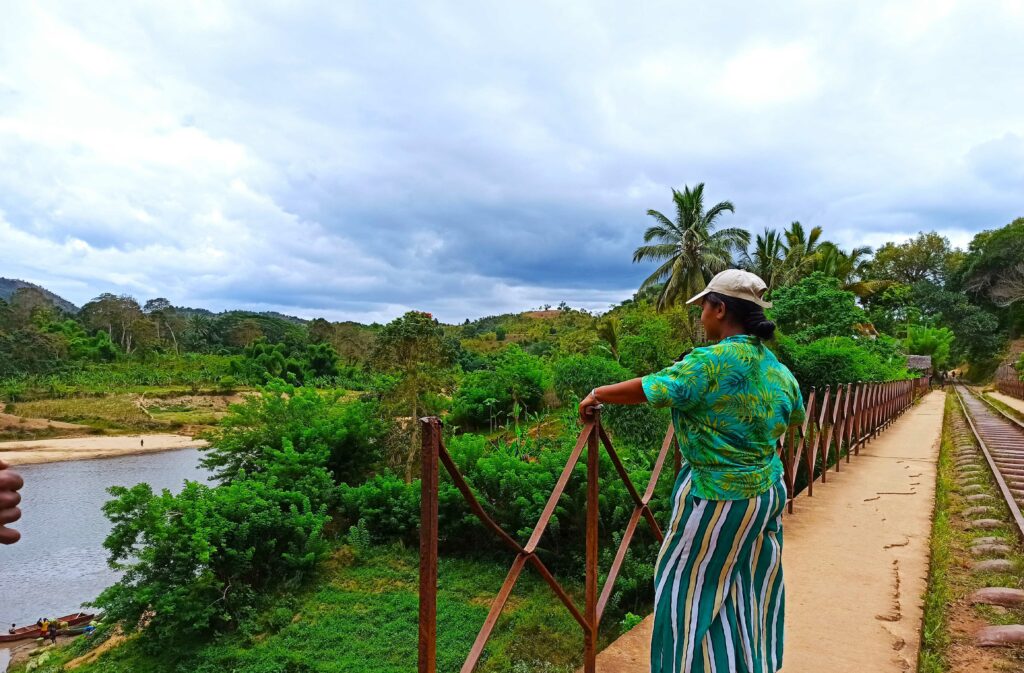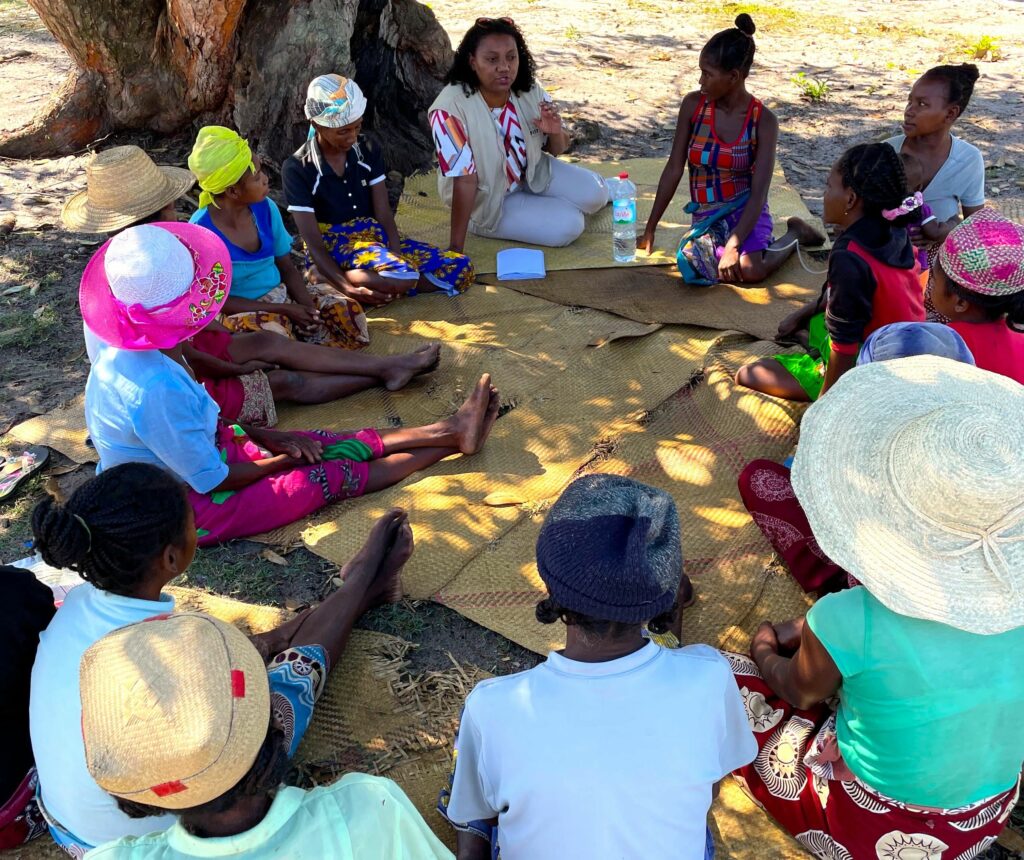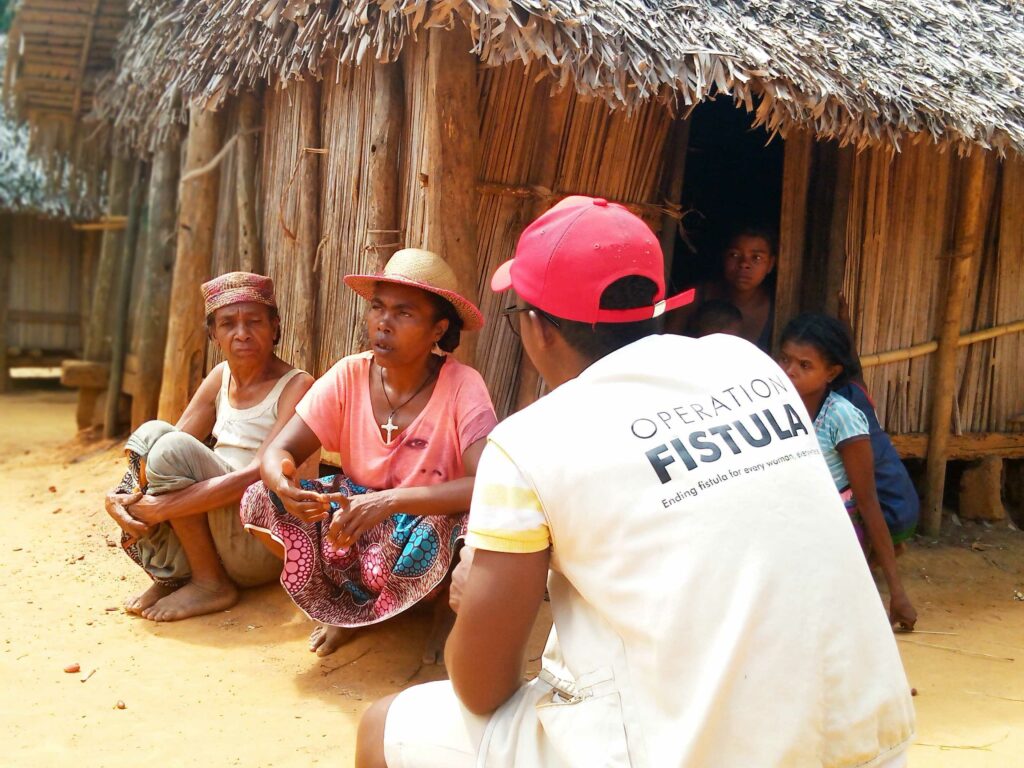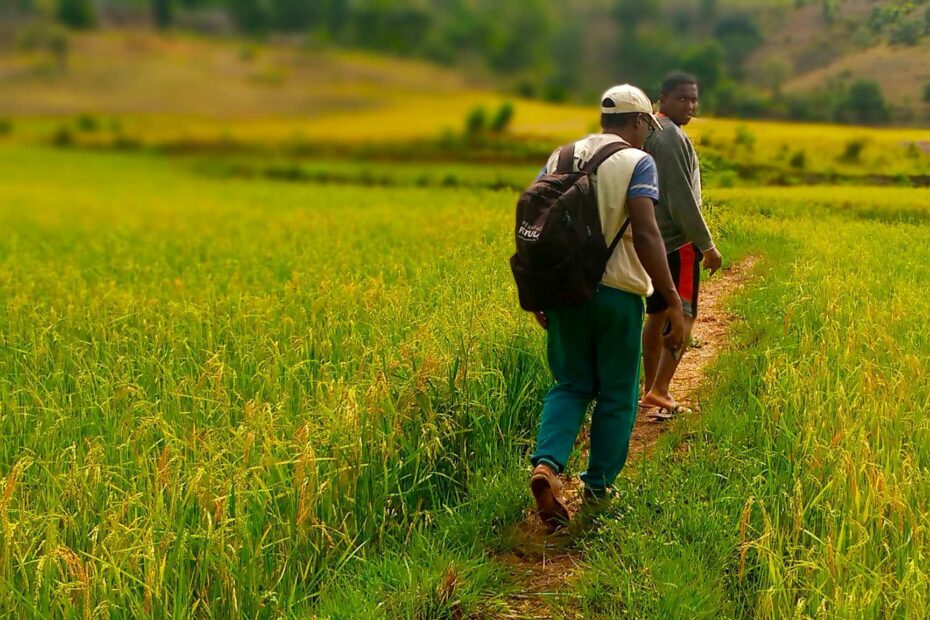This week Harena Randrianasolo, our Social Media Specialist, interviewed our Community Engagement Coordinator, Rovahasina Ralaindimby, about Operation Fistula’s community outreach and engagement work.
Rova has been working with Operation Fistula since 2020, and leads and manages our community outreach officers in their mission to visit communities and find patients in need of care. In the below Q&A, she shares some insights into what this work entails, and what it means to her.
Tell us about the typical journey our outreach workers take in order to reach a community. What are the challenges?
Typically, we spend the first two days traveling by taxi-brousse — Madagascar’s public transportation system. This gets us as far as we can go on the main roads. You’re sharing space on a bus with lots of other people, other animals — some sheep, usually!
Once we get as far as the taxi-brousse goes, we either hop on the back of a motorbike or finish out the rest of the journey on foot. This might be a full day of walking — 20 kilometers or so. And in rainy season, that means walking through knee-high “puddles” or trudging through mud. Motorbikes can’t pass through on those conditions, so we use our feet! Sometimes we will hitch a ride on a little pirogue — a wooden raft that floats on empty plastic canisters.
We don’t pack much gear, because we know that everything we bring we’ll have to carry on our backs. Most of the communities we work in lack electricity, or even small hotels, so we rely on the generous hospitality of community leaders. We bring sleeping bags and stay in the little wooden huts some people have next to their houses.

In your experience, why is community engagement such an important part of our program?
Our approach to community engagement has been designed to address the following basic barriers to care:
- Women with fistula do not know that their suffering is caused by an injury that can be treated.
- Communities do not know what fistula is or why it happens. They see women with the injury as cursed, or unclean, shunning them from society, and they don’t know the actions that can be taken to prevent fistula.
- Most women with fistula live in very isolated places that are unmapped, very difficult to reach, and far from the health system.
These barriers are pervasive in Madagascar. We know that because women with fistula experience such deep ostracism — affecting their family, social, and economic lives — they often do not trust outsiders, or believe that anyone wants to help them. In order for us to improve lives, we have to travel to them, not expect them to come to us. We need to engage directly with these women and all their neighbors, offering our help and building relationships. It’s face-to-face communication and contact that usually persuades them to trust us.
What is it like to meet with community members to talk about fistula? How do they react?
In 2020, when we were testing our outreach strategy, we encountered a lot of resistance, or confusion. It was such a new topic for most of them. They were used to community health workers talking about HIV or malnutrition or malaria, but not fistula.
Another challenge is that nearly everything we need to talk about, in order to help people understand what we do, is taboo in Malagasy culture. Entire categories — menstrual hygiene, sexual health and STDs — are off-limits, usually.
But in the last two years, it’s gotten much better. People are starting to know us, and we’ve implemented radio campaigns across entire regions, so that people are hearing about fistula before we even arrive in their communities. We’re still combating rumors — that fistula is a kind of curse, or a punishment for bad behavior, for example — but insisting on more open conversation has really helped.
It’s always going to be difficult to convince people to go to the hospital, either to give birth (and thus hopefully prevent a fistula) or to get treated for a fistula once it’s happened. Women want to do what their mothers and their grandmothers did. They want to do what’s trusted, and give birth at home with a matron (a traditional birth attendant). It makes sense — you trust the people you know, the people who are close to you.
But part of what Operation Fistula does is engage with those matrons, too, so that they understand the benefits of pre-natal care and learn how to spot a potential obstructed labor that may need professional medical intervention.
A big part of what we do during our time in the communities is finding these trusted people and asking for their help. We spend time with all sorts of influential people, including mayors, chefs de village, and religious leaders. It is completely logical to trust your own neighbors more than outsiders. So, relationship-building is key.
Finally, speaking purely from a logistics point of view, you have to get up really early to talk to people! We sometimes go door-to-door in a community, but people work during the day, so daytime hours aren’t convenient. So we are accustomed to starting our days at 5AM and catching people before they go to the field, and later in the evening as well. We work long days. We will use the time when the community members are at work to travel on to our next destinations, or to meet with community leaders, who hold normal office hours during the day.

Have you met patients during your time in the communities who have made a particularly big impression on you? What was her life like? What did she say about living with fistula?
In general, patients are really happy with the care they receive, and they keep in touch with the community outreach officers who first identify them in their villages.
One of our Patient Ambassadors, for example: her name is Florentine, from Manakara district. She had a really difficult time when she was living with her fistula — she felt completely excluded from community life, to the point that she wasn’t welcome at church.
But our community outreach officer brought her to the health facility in Mananjary, where she received a successful fistula repair. She became dry thanks to Operation Fistula’s partner surgeon, Dr. Rynah, and a month later she called to tell us she felt so happy, that people had accepted her into the community again, and that she was buying slips and feminine undergarments that made her feel pretty. And she wanted the whole community to know. She felt normal. Since then she’s grown a vegetable garden and started raising chickens to support herself. It’s a total transformation!
Not all stories are as happy. Sometimes we return to a community many months after we’ve first been there, to do an audit and see if we believe the area is “fistula-free.” We occasionally meet a patient who was treated, but still isn’t dry. Obviously, this is devastating for her, and for us. And this is one of the biggest challenges of our work right now — making sure that when surgery is not the solution for a particular patient, that we have other ways to help. We’ll talk more about that part of the work when we share more about our patient follow-up process.
Can you explain what fady is? How does it impact the way we approach our work?
A fady is a taboo. The most common one is that a woman can’t be treated by a male doctor.
Though fistula is usually a childbirth injury, it is perceived as a “sexual disease,” and that’s considered taboo here in Madagascar — anything to do with sex is seen as fady. So, it makes it really difficult to talk about everything that relates to our work! If a patient is there with her father, the father has to leave so we can speak openly.
Aside from health fady, there are other general taboos. In most communities, there is a day of the week when it’s fady to work (often Tuesday or Thursday). People will stay home and refrain from working on that day. So, if there’s a woman who goes into labor on a Tuesday, she can’t do anything about it until the next day.
It also means we need to know about a community’s fady day in advance, because we don’t want to arrive on a Tuesday hoping to do a community meeting, only to be told we have to wait until the next day. Likewise, some communities observe a fady whereby if you’re an outsider, you can’t cross the river that isolates the community from the other side of the land. So, if you’re trying to visit a community like that, separated by a river, you won’t be allowed. You have to ask community members to cross the river and come to you.
Fady adds an additional layer of complexity to all our outreach work, but by listening and learning to be sensitive to what is considered fady in a place, we are more able to build trust and respect with communities.

What do you like most about your work? What motivates you to keep going?
I studied social and humanitarian issues at university. I love that this work enables me to travel all around Madagascar, understanding new social contexts and cultures.
Fistula is a delicate subject in Madagascar, and these two years with Operation Fistula have allowed me to meet so many different Malagasy women who have suffered from this injury, but who we can help. We can change lives, and slowly we can change behaviors and systems.
There are a lot of other important issues out there in the communes, but so little attention is paid to fistula. We can provide that. It’s a personal challenge for me to try to find every woman who’s suffering and give her an opportunity for care — all aspects of her quality of life.
It also excites me to be able to develop new strategies — testing what works and what doesn’t. And to collaborate with my colleagues, who have such diverse strengths and experiences.
Join us as we continue to drive progress towards our mission, and work for a fistula-free future! Follow us on Instagram, Twitter, and LinkedIn to stay in touch with all our news and updates.
